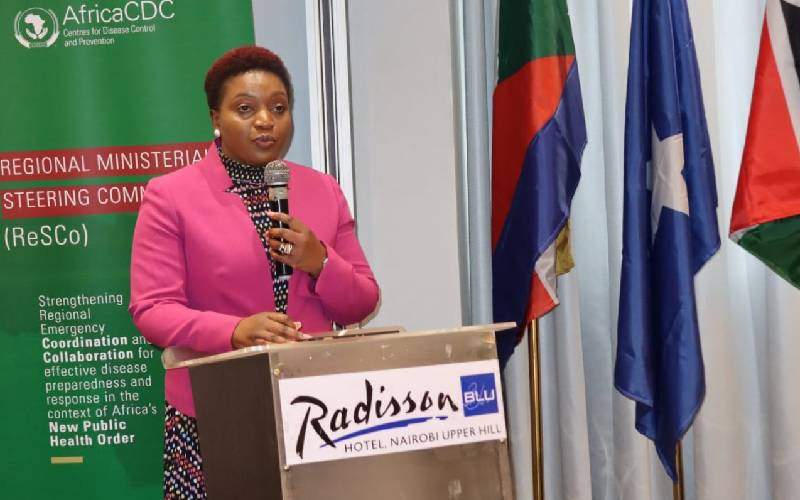You can take a man to Lavington, but you can’t rid him of the village urge to circumcise his daughter.
It appears that educated and affluent families in Nairobi steeped in outdated cultural practices are bussing their young daughters to the countryside for the cut in ‘hygienic conditions’ as hospital patients.
As a result, clinics in Kuria and Kisii are making a killing charging between Sh500 and Sh1,000 for a practice that has been condemned as Female Genital Mutilation (FGM). The ‘sick’ girls are admitted in the rural hospitals for a week to recover from the cut.
Dr Linah Jebii Kilimo, who chairs the Anti-Female Genital Mutilation Board, says she is aware of this practice.
“It is a reality. We hear people talking about it. Even professionals now take their daughters to their grandmothers in villages, where they undergo the cut, under the pretext that the family is just visiting,” she says.
A nurse who works in Gucha District says the girls are admitted in clinics, mostly in small towns, away from the scrutiny of public administrators.
“These are mostly nondescript clinics, which hardly draw any attention and charge between Sh500 and Sh1,000 for their services. There is one in Mogonga, about 25Km from Kisii town, that is particularly famous for the procedure,” reveals the nurse.
Another nurse in Nyamira County discloses that the practice is very common. She says, “I can confirm that it is being done in secret without the traditional fanfare. Both the rich and poor still practice female circumcision. Because of the stigma associated with uncircumcised women, the parents of these girls want their daughters to fit and be accepted.”
But while the law has helped curb FGM, matters are complicated by the fact that some lawmakers and public administrators openly support the practice. Kitutu Chache North MP Hon Jimmy Angwenyi for instance defended FGM in Parliament terming it “just a small cut.”
“I wonder why this Parliament wants to criminalise people’s culture when in fact we have not made a law to criminalise homosexuality, which is a Western culture. The Kisii culture requires that we have a small cut on our girls,” said the lawmaker.
Angwenyi’s statement irked Nyamira Women Rep Alice Chae who told the House, “I wish he (Angwenyi) was a woman like me who underwent FGM. It is wrong, it is pathetic, and it is primitive. Men run away from us and go for women from communities that don’t practice FGM.”
Migori County Women Rep Denittah Ghati castigates the elite and administrators who support the practice despite enough scientific evidence that show it is a fundamental violation of young girls’ rights.
“I have heard of such cases. It happens and it reflects poorly on us. We know of educated chiefs, even professors and people from unbelievably distinguished families, who take their daughters home during the holidays and secretly have them circumcised.
“This has greatly affected the gains we have made in anti-FGM campaigns,” laments the Women Rep. “The elites are setting a bad example to the poor and uneducated in the village, who look up to them. They see no reason to shun the practice when the so-called ‘big people’ are practicing it,” says Ghati.
While Chae has the guts to publicly declare that she underwent the cut, many women from Kuria and Kisii rarely admit it.
Abigael Nyaboke*, a 27–year-old accountant says, “I was lucky to have escaped the ‘cut,’ but nearly all my friends are circumcised. We don’t talk about it, lest they think I’m mocking them.”
Janette Oyaro* who was also ‘cut’ carries this burden with shame.
“I can’t admit it even to my best and closest friends. My mother took my sister and I to the village when we were still in primary school. It is our grandmother who performed the procedure. Most Kisii women I know are against it and if they had a way of escaping it, they would have,” says the 25-year-old nutritionist.
But Sasha Onsongo*, who holds a BA in Sociology, has nothing against the practice because the Kisii ‘just nick the tip of the clitoris.’
“It is subjective. We just need to understand why people do it. We would probably understand their perspective if we are in their shoes. I have relatives who swear they will do it to their daughters. They argue that it tames libido.
“It is infibulation practiced by the Somali and Maasais in Kajiado and Narok that I’m against, though they have their reasons for it. In the case of Kisiis, it is just a small incision. It is not harmful at all in terms of reproduction. I underwent it and no man can tell. I have orgasms. I think it only curtails pleasure if it entails excision, infibulation or clitoridectomy,” she explains.
 The Standard Group Plc is a multi-media organization with investments in media platforms spanning newspaper print
operations, television, radio broadcasting, digital and online services. The Standard Group is recognized as a
leading multi-media house in Kenya with a key influence in matters of national and international interest.
The Standard Group Plc is a multi-media organization with investments in media platforms spanning newspaper print
operations, television, radio broadcasting, digital and online services. The Standard Group is recognized as a
leading multi-media house in Kenya with a key influence in matters of national and international interest.











